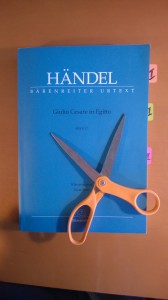 The scissors have been out for the entire month of March. A beautiful opera that lasts more than four hours must be trimmed. (And as so many of us know personally after a long winter of cold and sloth, trimming is hard work…) Yet, the musical scissors must be wielded, and almost an hour’s worth of music must go.
The scissors have been out for the entire month of March. A beautiful opera that lasts more than four hours must be trimmed. (And as so many of us know personally after a long winter of cold and sloth, trimming is hard work…) Yet, the musical scissors must be wielded, and almost an hour’s worth of music must go.
Now, I know there are those of you in my readership who are screaming “WHY?!?” And I can certainly empathize. I know Handel’s Julius Caesar pretty well. Probably a little too well. Around almost every corner lies music that I can’t bear to part with. But for many different reasons, it is important that our version come in somewhere between 3 and 3 ¼ hours.
Enjoying Baroque operas in their full-length uncut glory is a wonderful thing. So why do we cut? I’m oversimplifying a bit, but I have two different motivations. And they don’t come in the order you might expect:
First and most important, expectations of a modern audience are wildly different than in Handel’s day. If you went to opera in the mid-18th-century, you probably didn’t do so after working a 10-day hour day. And you certainly didn’t sit quietly in the dark. You could move around and stretch, eat, talk, probably even play cards. Of course, we’ve gained a lot with our modern opera decorum. (For example, you can actually hear most of the opera.) But the length and quality of sustained attention now required is dramatically different than what Handel imagined, and we want our audiences to experience the beauty and passion of this opera without feeling as if it’s an exercise in stamina.
Second, operas get more and more expensive the longer they go on. Not only in terms of performance costs, but also on the rehearsal side. And for a small frugal company, it’s important to focus resources so that things don’t sprawl too severely and can be done well. Most of our singers are debuting their roles (not just in Julius Caesar, but across the board), and trimming a Baroque role allows them to focus their efforts and energies, too. When they move on to do an uncut (or a slightly fatter) version elsewhere, it’s a luxury for them to be able to draw on this very focused experience and add just a bit to it.
The dangers in this process are numerous and not insignificant. Balance and proportion are key. The trimmed version must have integrity when viewed from many different perspectives – the presence and strength of each character in each act, the balance of different tempi and affects, the structural importance of the da capo aria (more on that in a subsequent post), the momentum and architecture of the story. For if an opera’s cut are ill-advised, the whole thing can backfire, and the performance will actually feel longer…
I sometimes feel as if I’ve been given the gift of a fabulous family vacation but I have to choose to leave some of the children at home… But they’ll be fine, right? :)
Great point! Last season I went to the Dutch National Opera to listen to Handel’s “Deidamia” un-cut. It was a torture. And I am a singer AND baroque opera lover AND Handel aficionado. But it is really, really super difficult to focus for 4 and a half hours. There was almost no audience left till the end.
Thanks for “balance” and being so selective, now you can save the very best of Handel………right on for three plus hours !